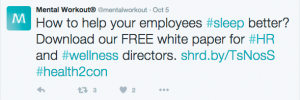How to repurpose a white paper by creating tweets
Here’s how to repurpose a white paper by creating tweets from the actual document.
This is part 6 of our ongoing series on how to repurpose a white paper.
You can find links to the first 5 parts of our series at the end of this article.
 We don’t think of social media as “content.” Rather, it’s a channel you can use to promote B2B content.
We don’t think of social media as “content.” Rather, it’s a channel you can use to promote B2B content.
Social media can be a powerful way to publicize a white paper; that’s why we included creating tweets for Twitter to wrap up this series.
Forget Facebook, but use LinkedIn
Facebook is still unproven as a B2B channel.
We’ve spent years looking for any B2B company that consistently generates quality leads through Facebook…and we’re still waiting.
LinkedIn is much more useful for B2B, mainly because people use it primarily for business networking and to explore their professional interests.
For example, our own LinkedIn group, Get More from Your White Papers now numbers 500+ people. You can ask any questions you like about white papers there.
We recommend sharing your new white papers with LinkedIn groups related to your topic or industry. You can also use LinkedIn’s blogging tool to post articles related to your white paper.
Tweets can go far
Opinions on Twitter’s reach may differ.
But consider the potential if you send your tweet out several times to your 2,000 followers, and some of them in turn share your tweet with their followers.
Following a regular posting schedule with well-developed tweets will definitely expand the reach of your white paper.
[Tweet “Regularly posting well-developed tweets will expand your white paper’s reach.”]
The actual tweets for this white paper
Our client created the tweets for our sample white paper, and we think he did a reasonable job.
Here are the ones he set up:



Some Twitter tips
- Shorten the url.
You only have 140 characters. You don’t want them all taken up with the url. You can find various tools for this. We use bit.ly. - Don’t use all 140 characters in your tweets.
Tweets that are 100-130 characters have been proven to get the most engagement and retweets. This allows your followers space to add a comment when they’re retweeting. People often avoid retweeting if they have to rewrite the tweet to add their own input. - Tweet more than once a day.
Tweets have a shorter shelf life than other social media. Your tweet will reach half its total engagement within the first 20 minutes of being posted. And even after several tweets, not all of your followers will have seen it. - Use a tweet button on your landing page.
That way, your audience can quickly click to tweet the link out to their followers. - Use promoted tweets.
These can make sure your tweets go directly to the audience you want, without getting buried in the news feed.
What to put into a tweet
Look for key points in the white paper that might entice your audience. Short headlines often work well. Tell your audience how the white paper will help them. Include the download link.
Our client did a great job with short, snappy sentences, including the download link and incorporating relevant hashtags.
Don’t know what hashtags to use?
Try what you’re using in other social media or for SEO.
Rather than listing a string of hashtags at the end of your tweet, pick one or two keywords that fit the topic well and write them into the tweet.
If you’re still stuck, use a tool like Google Keywords to see what hashtags other people in your field are using.
If you feel like you’re retweeting too much, you can always use the #ICYMI (in case you missed it) tag on any recycled posts.
So there you have it. Repurposing your B2B white paper into some relevant tweets is an excellent way to get the word out.
Have you ever written tweets for a white paper? Do you have any more tips to offer? Please leave your comment below.
Catching up on the other parts of this series
See part 1 on the original white paper
See part 2 on repurposing it as a press release
See part 3 on repurposing it as a set of blog posts
See part 4 on repurposing it as a slide deck
See part 5 on creating a landing page
We hope this has been a useful series, and we wish you good luck repurposing your white papers!
Want to hear whenever there’s a fresh article on this site? Subscribe here to stay in the know on long-form content. From time to time, we’ll also send you word about some great new resource or training. And you can unsubscribe any time.



